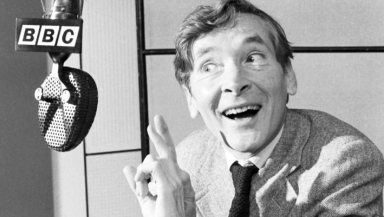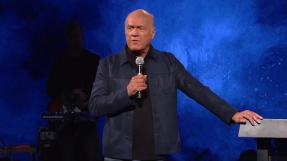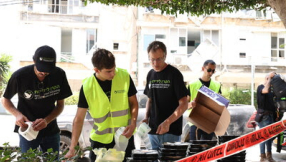
At the height of his fame in the 1970s, Kenneth Williams was asked to record excerpts from the Bible. Those recordings hadn’t been broadcast until the BBC did so at the weekend on Radio 4. So, was Kenneth Williams a closet Christian?
By all accounts, Kenneth Williams - beloved Carry On star, master of double entendre, and fixture of BBC Radio 4’s Just a Minute - was not a man readily associated with religion. With his flamboyant persona and razor-sharp wit, most would expect him to meet any mention of the Bible with a raised eyebrow and one of his famous quips. But new evidence reveals a deeply personal, previously concealed Christian faith - and with it, a series of forgotten Bible recordings now shared with the public for the first time.
The BBC programme Archive on 4: Said the Actor to the Bishop, aired 12 April on Radio 4, uncovers a remarkable chapter in Williams’s life - audio cassettes of him reading Bible stories with emotional depth and vocal mastery, recorded nearly 50 years ago.
Long thought lost, the recordings have been revived thanks to the man who commissioned them: James Jones, former Bishop of Liverpool and past chair of the Hillsborough Independent Panel.
Back in the 1970s, Jones worked as a producer at the evangelical organisation Scripture Union, then producing a series of tapes featuring actors narrating Bible stories. He secured major names such as Derek Nimmo, Thora Hird, and Dora Bryan - and turned to Williams, whose storytelling brilliance had captivated a generation of children on Jackanory.
“I was carpeted for using Kenneth,” Jones recalls. “My bosses feared the reaction to his association with the Carry On films and their bawdy humour.” But Jones trusted his instincts: “To use a comic actor captured the humour and the humanity of the stories that Jesus told.”
The sessions left a profound impression. “The first recording I did with him was of the Parable of the Prodigal Son,” says Jones. “After the first take, I asked if we might do a second. Indignantly, Kenneth protested, ‘Why? What was wrong with that one?’ ‘Nothing,’ I spluttered. ‘It was perfect.’ ‘Then let’s do the next one!’ And it was perfect.”
Williams brought his full theatrical arsenal to the task - booming basses, shrill falsettos, reedy whines and booming proclamations - animating New Testament characters in a way that captured the moral force of the stories while preserving their humanity. “He knew something Jesus clearly knew,” says Jones. “The power of good storytelling.”
What emerged in those sessions astonished Jones. Williams deployed his unparalleled vocal range to bring New Testament characters vividly to life. “It was his own faith that he brought to these stories,” says Jones. “You can hear he believes in the way he reads.”
One moment particularly struck Jones: Williams’s telling of Jesus being tempted in the wilderness. “Temptations were something like all of us that he lived through,” Jones reflects. “But he was quite self-controlled. He didn’t often give in to them.” Speaking in the programme, he cites Williams’s close friendship with the playwright Joe Orton: “He wouldn’t do what Joe was doing but he would quite like to know what was going on.”
The emotional climax of the recordings comes in Williams’s rendition of the parables of the Good Samaritan and the Prodigal Son. His narration, full of compassion, reveals not just technical brilliance but personal resonance. “He brought to it his relationship with his own father. There was an ache there for that love,” Jones says.
Jones recalls his conversations with Williams over lunch at the time of the recordings, when the actor opened up about a personal faith that had remained hidden from the public eye. “Faith really mattered to him,” Jones explains. “He would end every day praying and asking for forgiveness.”
Williams’s diaries, published posthumously in 1993, offer glimpses of that inner life. “I am full of the feeling of nearness to God,” he wrote. “For me God means Truth and Goodness and Beauty … one real act of love … please let me be capable of it.” Jones describes his spirituality as “almost mystical”.
Yet Williams remained ambivalent about religious institutions. “He was very critical of the Church and bishops, didn’t like the structure,” says Jones. “He didn’t go to church. He felt his urge to entertain people would get in the way of being part of a church community. He had to get away to pray. Performance was a barrier to God.”
While the actor never made his faith a public part of his persona, some of his closest friends suspected there was more beneath the surface. The Very Rev Mark Oakley, now Dean of Southwark, recalls: “We would meet up every two or three weeks. I wanted to hear all about the Carry On films … He would often talk about the quiet inner life and his striving for God.”
Others, like Gyles Brandreth, were in the dark about his private quest for faith - but not entirely surprised. “He was the funniest man I ever met,” says Brandreth, who appears in the Radio 4 programme. “It would be sad if all people remembered Kenneth for was ‘infamy, infamy, they’ve all got it in for me’. Now, thanks to these Bible readings, we get another side - Kenneth telling what for many people is the greatest story ever told.”
Born in 1926 to Charles, a Methodist, and his devoted mother Louie, Williams first discovered Bible stories at Sunday school.
Though he later gained fame through stage, radio and screen - most notably in the Carry On franchise - his faith quietly accompanied him throughout his life. His diaries show him wrestling with guilt, loneliness and longing, often turning to God in times of need. In 1964, while preparing for Carry On Spying, he noted that he was giving up “fags, then drink” for Lent “to start making some sort of gesture to God”.
The rediscovered recordings had been feared lost when Scripture Union destroyed the master tapes. But Jones had kept personal copies and, mentioning them to a BBC producer, set in motion the creation of Said the Actor to the Bishop.
Archive on 4: Kenneth Williams: Said the Actor to the Bishop aired on BBC Radio 4, Saturday 12 April and is available on BBC Sounds.













